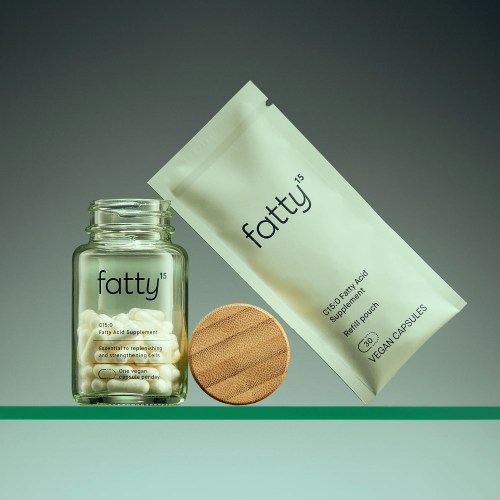Our editors independently select these products. Making a purchase through our links may earn Well+Good a commission
I Tried the Trendy New Fatty Acid From Fatty15—Here’s What I Thought
If you're interested in learning about pentadecanoic acid, look no further.

While there’s been plenty of buzz around omega-3 fatty acids for years, a new fatty acid has entered the chat and is getting some serious attention: pentadecanoic acid (also known as C15:0—it’s molecular name for my organic chemistry nerds out there). And with research discovering benefits like improved immunity, heart health, longevity, and cognition, there’s a slew of reasons to love this fat.
But as an RD of over a decade, I personally haven’t been all that privy to this fatty acid—and certainly didn’t learn much about it in school way back when—showing just how up-and-coming it really is. Here I’ll outline what pentadecanoic acid is, how it benefits the body, and my personal experience trying it as a dietary supplement.
What is Pentadecanoic Acid
It’s no wonder that I previously wasn’t very familiar with pentadecanoic acid, as it’s the first essential fatty acid to be discovered in recent history1, since omega-3 fatty acids. Consensus-driven evidence around C15:0 really has only started to take off in the last 10 years—likely why I didn’t learn about it in school many moons ago.
But unlike omega-3s (which are unsaturated fats), pentadecanoic acid is a type of saturated fatty acid. Saturated fats have long been associated with increased cholesterol levels and heart disease risk—and thus generally poo-pooed by the healthcare community. However, pentadecanoic acid is actually a great example of how that picture is murkier than previously thought. While some studies have found2 saturated fat to be tied to increased cardiovascular disease risk, others have not3 discovered as strong a correlation. One of the thoughts behind these conflicting findings is that there are several different types of saturated fatty acids, each of which has varying effects on the body—some helpful to overall health and others less so.
How Pentadecanoic Acid Benefits Health
Pentadecanoic acid just so happens to be one of these beneficial saturated fatty acids, as discovered in the research.
It’s been identified as a potent anti-inflammatory, antimicrobial, and even anti-cancer4 agent in the body, just like omega-3s, but even more pronounced in many studies. Initial research also shows it to be supportive of cognitive health and protective against neurodegenerative diseases5. But that’s not all, it may also encourage liver and gut microbiome health6 while lowering the risk of cardiometabolic diseases7 through improved cholesterol levels and blood sugar regulation.
Interestingly enough, evidence also shows that deficiency of this fat may be linked to8 increased risk of iron overload, heart disease, diabetes, and non-alcoholic fatty liver disease. This burgeons the argument that pentadecanoic acid should be considered an essential fatty acid—or at least be more readily included in the fat conversation.
However, what many people are most excited about when it comes to C15:0 is its impressive ties to longevity and anti-aging9. This is thanks to its ability to strengthen cell membranes, clear damaged cells, boost mitochondria function, and naturally activate pathways and receptors key to healthy cells. These cellular benefits can translate to improved joint function, healthier-looking skin, better energy, deeper sleep, luscious-looking hair, and more.
My Experience with Pentadecanoic Acid
While pentadecanoic acid can be found in butter, other full-fat dairy products, fatty fish, animal-based fats (like tallow), and even certain types of algae, C15:0 can also come in the form of dietary supplements. These conveniences are especially helpful if you follow a plant-based diet, are dairy-free, or want to limit high pentadecanoic acid foods for any other reason.
I recently tried Fatty15—a vegan pentadecanoic acid supplement intended to improve cell health and support longevity, immunity, and overall wellness. My omega-3 supplement had run out right when I decided to try Fatty15, presenting the perfect opportunity for assessing how it made me feel.
First Impressions
When I first opened the package, I must say I was impressed. I’m a sucker for pretty packaging, and this supplement definitely fits the bill with a sleek glass bottle with wooden lid. Of course, it’s what’s inside that really matters (but pretty packaging doesn't hurt).
I tried Fatty15 for almost two weeks, and while no drastic changes occurred, I generally had good energy levels, clear skin, restful sleep, and was in high spirits over that time, and experienced no negative side effects whatsoever.
While I didn't have any major changes, the benefits of pentadecanoic acid are certainly alluring enough for me to continue taking it, so I can monitor how I feel and how my skin and hair look, especially since I’m not a big dairy or meat eater. I loved that the dosage was very approachable, too, only one to two capsules a day—very different from some fatty acid supplements.
The nearly 6,000 reviews on the product are super interesting to read and provide valuable insight into the longer-term effects of Fatty15 as well. Users have reported lower A1c levels (the main blood test for diabetes diagnosis), better sleep, more energy, improved skin health, clearer cognition, brighter mood, a deeper sense of calm, and more—very impressive!
Final Thoughts
When it comes down to it, the research behind pentadecanoic acid is downright compelling. As a registered dietitian, I’m somewhat new to learning about this nutrient and have been really impressed with the evidence that I’ve found (so far) on C15:0. I’ll be keeping a close eye on how the healthcare community continues to receive pentadecanoic acid and am curious to see how it might impact the nuanced conversation surrounding saturated fats.
To get enough of this nutrient, you either need to eat butter, animal-based fats, or certain fatty fish or seaweed on a pretty regular basis—a tall order for many folks. This leaves a dietary supplement as a more viable and approachable alternative.
While there aren’t many pentadecanoic acid supplements to choose from yet, Fatty15 is leading the charge, providing a clean, vegan-friendly, and accessible product that can help you reap all the benefits of this nutrient. I personally had a pleasant experience trying this supplement and am looking forward to seeing how I continue to feel taking it—especially knowing all the robust evidence behind C15:0.
- Venn-Watson, Stephanie, et al. “Pentadecanoylcarnitine Is a Newly Discovered Endocannabinoid with Pleiotropic Activities Relevant to Supporting Physical and Mental Health.” Scientific Reports, vol. 12, no. 1, 23 Aug. 2022, https://doi.org/10.1038/s41598-022-18266-w. Accessed 18 Mar. 2025.
↩︎ - Aramburu, Adolfo et al. “Effect of reducing saturated fat intake on cardiovascular disease in adults: an umbrella review.” Frontiers in public health vol. 12 1396576. 3 Jun. 2024, doi:10.3389/fpubh.2024.1396576 ↩︎
- Teicholz, Nina. “A short history of saturated fat: the making and unmaking of a scientific consensus.” Current opinion in endocrinology, diabetes, and obesity vol. 30,1 (2023): 65-71. doi:10.1097/MED.0000000000000791 ↩︎
- Venn‐Watson, Stephanie, and Camden N Butterworth. “Broader and Safer Clinically-Relevant Activities of Pentadecanoic Acid Compared to Omega-3: Evaluation of an Emerging Essential Fatty Acid across Twelve Primary Human Cell-Based Disease Systems.” PLOS ONE, vol. 17, no. 5, 26 May 2022, pp. e0268778–e0268778, www.ncbi.nlm.nih.gov/pmc/articles/PMC9135213/, https://doi.org/10.1371/journal.pone.0268778.
↩︎ - Venn-Watson, Stephanie, and Eric D Jensen. “Aging-Associated Amyloid-β Plaques and Neuroinflammation in Bottlenose Dolphins (Tursiops Truncatus) and Novel Cognitive Health-Supporting Roles of Pentadecanoic Acid (C15:0).” International Journal of Molecular Sciences, vol. 26, no. 8, 16 Apr. 2025, pp. 3746–3746, www.mdpi.com/1422-0067/26/8/3746, https://doi.org/10.3390/ijms26083746. Accessed 26 June 2025.
↩︎ - Chooi, Yu Chung, et al. “Effect of an Asian-Adapted Mediterranean Diet and Pentadecanoic Acid on Fatty Liver Disease: The TANGO Randomized Controlled Trial.” The American Journal of Clinical Nutrition, 28 Nov. 2023, pp. S0002-9165(23)662859, pubmed.ncbi.nlm.nih.gov/38035997/, https://doi.org/10.1016/j.ajcnut.2023.11.013. Accessed 13 Dec. 2023.
↩︎ - Venn-Watson, Stephanie, et al. “Efficacy of Dietary Odd-Chain Saturated Fatty Acid Pentadecanoic Acid Parallels Broad Associated Health Benefits in Humans: Could It Be Essential?” Scientific Reports, vol. 10, no. 1, 18 May 2020, https://doi.org/10.1038/s41598-020-64960-y.
↩︎ - Venn-Watson, Stephanie. “The Cellular Stability Hypothesis: Evidence of Ferroptosis and Accelerated Aging-Associated Diseases as Newly Identified Nutritional Pentadecanoic Acid (C15:0) Deficiency Syndrome.” Metabolites, vol. 14, no. 7, 23 June 2024, pp. 355–355, https://doi.org/10.3390/metabo14070355. Accessed 15 Oct. 2024.
↩︎ - Venn-Watson, Stephanie, and Nicholas J Schork. “Pentadecanoic Acid (C15:0), an Essential Fatty Acid, Shares Clinically Relevant Cell-Based Activities with Leading Longevity-Enhancing Compounds.” Nutrients, vol. 15, no. 21, 30 Oct. 2023, pp. 4607–4607, https://doi.org/10.3390/nu15214607. Accessed 4 June 2024.
↩︎










